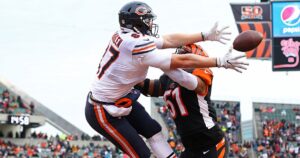by The Cowl Editor on January 31, 2019
Sports
By Cam Smith ’21
Sports Staff

The 2019 National Football Conference Championship featured the non-call heard round the world, as officials missed a clear pass interference penalty on Los Angeles Rams cornerback Nickell Robey-Coleman in the waning seconds of regulation. The penalty would have set the New Orleans Saints up with a first and goal with a minute and 45 seconds to play, but they were instead forced to settle for a field goal. In the ensuing overtime, Rams kicker Greg Zuerlein would send Los Angeles to Super Bowl LIII.
The debate around pass interference review is understandable because, if the correct call was made, it would be the Saints playing Tom Brady and the New England Patriots this weekend in Atlanta. Yet, there should not be an uproar over a team not advancing that rewrites the rulebook. What should dictate a change of this magnitude is if it is actually good for the game of football. Simply put, it would not be.
Replay has already taken over most of the game. Every scoring play and turnover is automatically reviewed by the replay assistant, who sends the head referee on the field to the replay booth if the play looks even somewhat questionable. In the final two minutes of each half, the replay assistant can do this for any play, excluding “judgement call” penalties. These rules already slow the game down, as they disrupt the flow of offenses and halt momentum for the sake of accuracy.
Creating any sort of system to review these judgment call penalties, such as pass interference, would increase the disruptions of play tenfold. In week one of the 2018 NFL season, an average of nearly 16 penalties was called per game. If the replay assistant had the ability to call down to the field for every one of these penalties, there would be a possible 16 additional stoppages in play per game.
Then comes the word “judgement” itself. Penalties such as pass interference are much more difficult to judge than say, watching the replay to determine if the ball crossed the goal line. Pass interference reviews will still come down to the official determining if there was enough contact to “significantly hinder” the offensive player from catching the ball. This wording leaves more up to the interpretation of the referee than is desirable.
Other factors are the flags that are not thrown. If coaches are able to ask officials to look for a flag on a seemingly uninterrupted play, imagine the uproar when a big play is negated for a sketchy holding penalty 30 yards away from the ball.
All in all, reviewing pass interference calls simply is not worth the slower rate of play and potential controversy it would cause. With NFL TV ratings dropping lately, from 17.9 million views per game in 2015 to 15.8 million this past season, the last thing the NFL needs is a game bogged down by constant review.